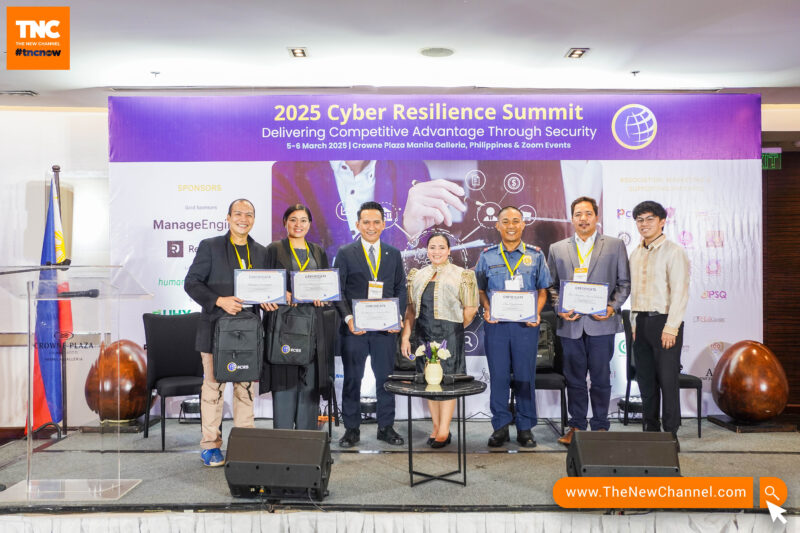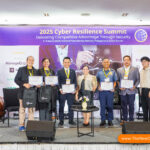The 2025 Cyber Resilience Summit: Delivering Competitive Advantage Through Security held March 5-6 at the Crowne Plaza Manila is the first of its kind in the Philippines. The event featured top level experts from the Philippines and the SEA region representing government, finance and technology, banking and healthcare, BPM, advocacies and education, and the Armed Forces.
While Cyber Security is getting more traction considering recent scam and deep fake headlines not unlike AI as the buzzword, the 2-day Cyber Resilience Summit flew in regional and global neighbours to share best practices on the real-world dangers and threats. It is not unlike real life battles, but one can consider digital threats more insidious by its free for all nature.
Top-notch resource speakers shared global models, forecasts, and the latest data and technology on cyber-attacks and scams, online fraud, fake news, identity phishing.
Cited by the World Economic Forum as the #4 security risk globally, the Cyber Resilience Summit urged leaders not to (just) delegate cyber security to ‘the IT guys’ but to prioritize cyber security at every level of enterprise and industry.
It’s always interesting to immerse in panel discussions that milk thought provoking perspectives. One such exchange at the 2025 Cyber Resilience Summit: Delivering Competitive Advantage Through Security was the topic Tackling Cybercrime – A Government Perspective featuring Colonel Francel Margareth Padilla-Taborlupa, Battalion Commander, Philippine Army, Cybersecurity; Ts Mohd Zabri Adil Bin Talib, Head of Responsive Technology & Services, CyberSecurity Malaysia; Police Colonel Jay Guillermo, Chief, Cyber Response Unit, Philippine National Police Anti-Cybercrime Group; Dr. Elizalde Javier Duran, MIT, Chairman & President, CyberSocPH, Chief IT Officer, National Police College & Chief, Center for Cybersecurity and Safety, PPSC-NPC.
Making the current rounds of cyber-security events, Col Francel Margareth Padilla-Taborlupa is fast becoming one of the most in-demand experts in the field both on local and regional stages. Where digital threats are rapidly evolving with the proliferation, and yes, dependence of digital, Col. Padilla-Taborlupa underscores the urgent need for a comprehensive, collaborative approach to cybersecurity. She highlights that cyberattacks do not only affect individuals and businesses but have far-reaching consequences for governments, military institutions, and law enforcement agencies.
Recognizing this, the Armed Forces of the Philippines (AFP) has been actively collaborating with various government agencies to fortify its cybersecurity framework. Col. Padilla-Taborlupa stresses that staying ahead of cyber threats requires continuous technological advancements. Governments must invest in cutting-edge technology to defend national security assets effectively.
The Philippines now has stronger ties with like minded and well meaning nations. All the exercises that we’re doing in the West Philippine Sea with our multilateral maritime activities like Balikatan exercises that used to be just between US and the Philippines had the French Navy and Australia joining, along with 23 different countries as observers.
“In 2025 it’s going to be one of the biggest. The exercises now are not just on the land, air and sea, it includes cyber. This addresses the cross boundary issues in terms of cyber. Treaties that we’re signing with the with different countries now will include cyber security.”
One of the most pressing concerns in the Philippines, according to Col. Padilla-Taborlupa, is the lack of comprehensive cyber operations laws. This legislative gap limits the full utilization of modern defense technologies. She emphasizes the need for a legal foundation that outlines the proper use of cybersecurity tools, applications, and digital defense systems.
In a significant step forward, Col. Padilla-Taborlupa shared that there are efforts to create such legislation. This move aims to bridge the gap between legal frameworks and emerging cyber threats, ensuring that law enforcement and defense institutions are equipped with the right technological tools.
Measures for staying safe and secure online are tedious. And most of the time, is deemed unimportant. Says Col. Padilla-Taborlupa, “If you say that passwords are 15 character long with a combination of upper- and lower-case letters, numbers and symbols that should be changed every 15 days that alone makes the users not want to use (security) technology. That’s why even for government (initiatives) it’s very difficult to balance cyber security laws for data privacy. But (cyber security) will be aided by legislation, by policies that are going to trickle down to the to the lowest units. And if we have the foundation from the laws of the land, like IRRs, then it will serve as a guide for all to implement.”
Furthermore, resilience through technological adaptation is crucial. Col. Padilla-Taborlupa advocates for the integration of artificial intelligence (AI) in defense mechanisms, enabling faster threat detection and response. By embracing AI-driven cybersecurity solutions, the government can bolster national security and mitigate risks posed by cyber adversaries.
Col. Padilla-Taborlupa’s insights highlight the critical need for governments—locally and across the globe—to collaborate and the urgent attention needed for technological advancement and legislative adaptation in the fight against cyber threats. Strengthening cybersecurity laws and investing in modern defense technologies will pave the way for a more resilient and secure digital landscape.









